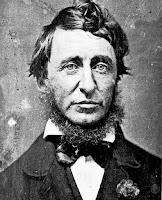Literature / Writer's Datebook: July 13
Brief biography of Henry David Thoreau. American writer, naturalist, political activist, critic, transcendentalist, famous for his book Walden and essay on Civil Disobedience.
American author Henry David Thoreau (1817-1862), is known for transcendentalism, a belief in the individual, and for his strong political views. He is the author of the famous Walden or Life in the Woods and the essay "Civil Disobedience." He was greatly influenced by Ralph Waldo Emerson and British writer Thomas Carlyle.
Early Life of Henry David Thoreau
David Henry Thoreau was born on July 12, 1817 in Concord, Massachusetts, US, the son of a pencil maker, John Thoreau and Cynthia Dunbar. His paternal grandfather was of French origin. Named after his paternal uncle, David Thoreau, he became Henry David after although, although he never petitioned to make it legal.
Thoreau was educated a Harvard University when he was just 16. He graduated in 1837, at 20 years old, the same year that Ralph Waldo Emerson gave his famous address urging American scholars to create a new culture separate from European influences. Thoreau became a good friend and follower of Emerson.
Simple Life at Walden Pond
At 27, he built a small cabin on Walden Pond near Concord, where he lived alone for over two years. He wrote about his time there, recording his daily thoughts and activities and described the environment going on around the pond. These observations and reflections became the source of one of his most important works, Walden, published when he was 37.
The book, however, went beyond just an observation for it had a message, a call for people to live simple lives, in harmony with nature and no surpluses of unwanted possessions.
Thoreau's Essay "Civil Disobedience"
When Thoreau was 29, he was imprisoned briefly for refusing to pay his taxes, which he did to express his opposition to slavery. This event in his life prompted him to write his essay "Civil Disobedience," in which he explained his belief that the government exists for the people, and therefore the people are more important.
Thoreau's Legacy
The beliefs and ideologies of Henry David Thoreau, most especially the importance of an individual and simple living, were great influence to 20th century prominent reformers who later adopted them, for example, Martin Luther King, who used them in his 1960s civil rights movement, Mahatma Gandhi (India), and Leo Tolstoy (Russia.) Thoreau died at the age of 44, on May 6, 1862.
Books by Henry David Thoreau
A Week on the Concord and Merrimack Rivers, 1849
"Civil Diosobedience," Essay, 1849
Walden, 1858 (Life in the Woods)
Cape Cod, 1865 (published after he died)
A Yankee in Canada, 1866 (published after he died)
Summer, 1884
Winter, 1887
Image Credit:
Henry David Thoreau. Wikipedia Commons / Public Domain.
Resources:
Biographical Dictionary, edited by Una McGovern, Chambers, 2002
Dictionary of Writers, edited by Rosemary Goring, Larousse, 1994
The Cambridge Literature in English, New Edition, edited by Ian Ousby, Cambridge, 1993
(c) July 2009. Tel. Inspired Pen Web. All rights reserved.


No comments:
Post a Comment